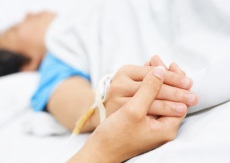What are the four foods?
Pomegranate – compounds in this fruit inhibit the formation of carcinogens and also inhibit cancer cells from producing growth hormones. In a number of studies they have been shown to reduce PSA production and levels.
Green tea – contains a type of polyphenol called catechins. These accumulate in prostate tissue and selectively kill cancer cells, reducing PSA levels. Studies in Japan show that men who drink the most green tea reduce their risk of prostate cancer by up to 86%.
Turmeric – this potent anti-inflammatory herb contains curcumin, which helps to reduce the spread of prostate cancer cells and so increase prostate cancer survival rates. It also stops cancer cells producing PSA.
Broccoli – and other cruciferous vegetables contain sulphur-rich compounds that are potent anti-cancer agents. Men who eat a lot of cruciferous vegetables have a 40% lower risk of prostate cancer. These foods also lower PSA production in cell studies.
 How to Prevent & Reverse Prostate Cancer
How to Prevent & Reverse Prostate Cancer
See what you can do to ensure you don’t develop prostate cancer and how to help yourself recover if you do. Read More
In the study, after supplementing concentrates of these food compounds for six months, PSA levels had risen by only 14.7% compared to a rise of 78.5% on placebo. That’s a 63.8% reduction. Also, 46% of men on the food supplements had stable or lower PSA levels, compared to 14% on placebo.
What else substantially lowers your risk of prostate cancer?
Increase key antioxidants, including zincWhat it does: Component of over 200 enzymes in the body, essential for growth, important for healing, controls hormones, aids ability to cope with stress….
Zinc is deficient in prostate cancer patients, and low levels are a good predictor of risk. Zinc protects against free radicalsFree radicals are molecules produced when the body breaks down food or by environmental exposure to things like cigarette smoke, pollution and radiation. Free radicals… and is anti-inflammatory, as well as helping to repair damaged DNA. Most of us don’t get anything like enough. I recommend supplementing 10-20mg a day and eating zinc-rich foods like seafood, nuts and seeds and nut/seed butters such as tahini.
Low seleniumWhat it does: Antioxidant properties help to protect against free radicals and carcinogens, reduces inflammation, stimulates immune system to fight infections, promotes a healthy heart,… is also a good predictor of prostate cancer. Foods rich in selenium include garlic and onions, sunflower seeds, mushrooms, whole grains, brazil nuts and fish. However, this mineral is often deficient in our soil so I recommend people also supplement about 100mcg of selenium. The recommendations for both zinc and selenium can be achieved in a good quality multivitamin.
Lycopene in tomatoes, quercitin in red onions, vitamin CWhat it does: Strengthens immune system – fights infections. Makes collagen, keeping bones, skin and joints firm and strong. Antioxidant, detoxifying pollutants and protecting against… and E are all important antioxidants, with good evidence suggesting an anti-prostate cancer effect both from foods and isolated nutrients.
Spices are amazing antioxidants, especially turmeric, cinnamon, chilli and ginger. I recommend you maximise your use of all these foods in your diet.
Avoid dairy products and limit meat
The foods most strongly linked to a higher risk of prostate cancer are dairy products, meat, especially processed meat, and alcohol. According to the National Cancer Institute (NCI), 19 out of 23 studies have shown a positive association between dairy intake and prostate cancer. Vegetarians have a lower prostate cancer risk and countries with the lowest dairy intake have the lowest rate of prostate cancer fatalities.
Dairy products promote high levels of an insulin-like growth factor (IGF-1) and both high IGF-1 levels and high insulinInsulin is a hormone made by the pancreas. It is responsible for making the body’s cells absorb glucose (sugar) from the blood…. levels are predictive of prostate cancer risk. You effectively keep insulin levels down by following a low GL diet.
 How to Prevent & Reverse Prostate Cancer
How to Prevent & Reverse Prostate Cancer
See what you can do to ensure you don’t develop prostate cancer and how to help yourself recover if you do. Read More
Helpful herbs
The most consistently helpful herbs are saw palmetto and pygeum. Saw palmetto has been proven to help inhibit cancer growth and to reduce inflammation. It also inhibits an enzyme, called 5-alpha reductase, which turns testosteroneTestosterone is a male sex hormone important for sexual and reproductive development…. into DHT, the form of testosterone that promotes prostate cancer. And it has been shown to inhibit the growth-promoting effects of IGF in milk. Since it’s the fatty acids in saw palmetto that seem to be most biologically active, choose a high quality supplement that is standardised to 45% fatty acids. I recommend 120mg a day for prevention and 360mg a day if you have prostate cancer.
The African bark pygeum also lessens the harmful effect of too much IGF and, in animal studies, is profoundly anti-cancer. When supplementing pygeum it’s worth getting a high quality standardised extract with up to five per cent B-sitosterol. I recommend 40mg a day for prevention and 120mg a day if you have prostate cancer.
For more information on how to prevent and reverse prostate cancer read my report here. Professor Jane Plant’s book Prostate Cancer – Understand, Prevent and Overcome is also available from our website.

Comments
Join the Conversation on our Facebook Page